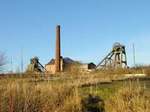
Technical | Steam-plant > Chimneys

Section under reconstruction
The East chimney is an octagonal brick structure approximately 130ft (40m) high. It is fitted with 29 iron retaining bands installed sometime after 1932 and was refurbished in 1999. It sits on a 16.3ft (5m) square base built of 4ft (1.2)m thick brickwork capped with a round-nosed sandstone drip moulding surmounted by a bevelled plinth of smooth-faced sandstone blocks. The foundations of the base have not been exposed and the depth of the base is not known.

East chimney, from south side


Damaged corner on base of East chimney
Damaged corner on base of East chimney
The walls of the base are pierced by 4 arched portals, one in each side. The portal on the E face provided maintenance access from the boiler-house floor whilst the deeper W portal appears to have been the main boiler flue-way entrance. The N and S portals are of a similar size to the W one, but at a higher level. All the portals are bricked up except for the W flue entrance.
It is not certain whether these are all original or whether some are later additions. In 1900 five new boilers aligned parallel to the engine-house were installed to the south of this chimney and these were flued into the south portal.


East chimney, E-side access portal
East chimney, W-side flue portal


East chimney, N-side flue portal
East chimney, S-side flue portal
The interior of the chimney has a circular cross-section, flaring slightly at the foot and is lined with a single thickness of silica fire-brick for a height of 52ft (16m). During the 1999 renovation works, the lining at the base of the chimney was found to be badly deteriorated and a steel support frame was installed in order to support the higher level lining.

East chimney - sweeps view
The original oversailing at the top of the East chimney consisted of a double projection of smooth-faced ashlar sandstone blocks with a round-nosed sandstone central drip moulding. This was surmounted by the circular cross-section stub brickwork of the mouth, terminating in a rounded, slightly projecting ?sandstone? lip.


West chimney oversailing detail (FoPP/JST)
East chimney oversailing detail (FoPP/JST)
The West chimney was built later and the oversailing appears to have been somewhat more delicate. The final lip also appears to have been absent. The base plinth of the west chimney also appears to have been different, photos from 1920 and 1986 showing it to have been constructed of large rock-faced ashlar blocks.


West chimney base circa 1920 (just visible beneath the platform over the wagons) (FoPP/JST)
West chimney base circa 1986 (FoPP/JST)
By an amazing stroke of good luck, during the 2010 major conservation works some of these blocks were found still laying around from the demolition of the East chimney in the late 1980s. The stone was the same as that used in the engine house walls and the blocks were cut up and used to restore all the damaged areas areas of the engine house west wall stonework.
2010 stonework photos here
During the 1950s upgrade the oversailing of the east chimney was rebuilt to give a 5 course projection of corbelled brickwork. The mouth brickwork was finished by an eight-section 14in x 8in x 1in cast-iron capping.


East chimney 1950s oversailing (FoPP/JST)
East chimney capping (FoPP/JST)
As part of the modernisation an induced-draft fan was installed and this was flued into the chimney about 5ft / 1.5m above the base. The bricked-up scar of the flue entrance can be seen both inside and outside on the north side of the chimney.
1970s plan and photo here


Induced-draft fan flue entry
Induced-draft fan flue entry
When the chimney was renovated as part of the 2010 major restoration it was covered with a fabricated steel hood clamped to the top iron band.

Post-1950s East chimney oversailing detail and post-2010 renovation steel hood
TOP
Copyright © 2023 J.S. Thatcher
Page updated on:
11 Nov, 2023
at
05:24:42 PM
In case of problems contact: